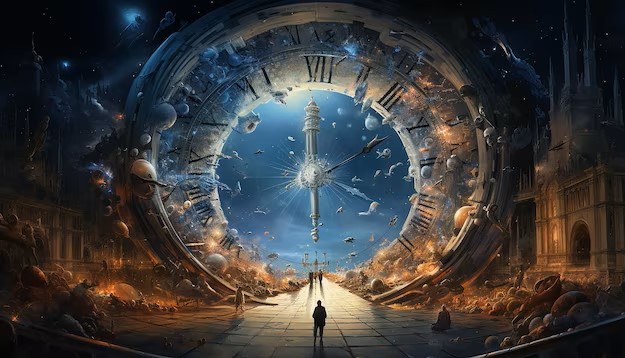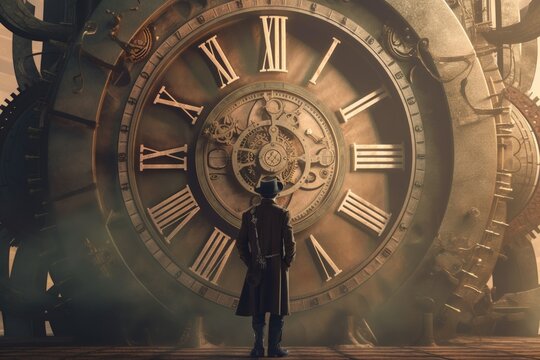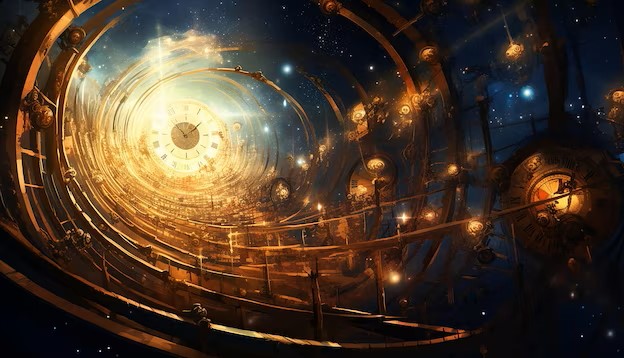Interesting Facts About Time Travel

Interesting Facts About Time Travel
Time travel has captured the imagination of humanity for centuries, sparking endless fascination and curiosity. The possibility of journeying through time, whether to explore the past or glimpse into the future, has been a recurring theme in literature, movies, and scientific discourse. In this article, we delve into the intriguing world of time travel, exploring its theoretical foundations, examining its portrayal in various forms of media and folklore, and contemplating the ethical and paradoxical implications it presents. Join us on this captivating journey as we unravel the mysteries and explore the possibilities of time travel.
1. Introduction to Time Travel
Defining Time Travel
Time travel, the stuff of science fiction dreams and late-night debates, refers to the concept of moving between different points in time. It’s like hopping into a DeLorean with Doc Brown or using a magical phone booth to visit different eras. While time travel has captured our collective imagination, let’s explore what it means.
Historical Perspectives on Time Travel
Believe it or not, people have been fascinated by time travel for centuries. Ancient mythologies and folklore often featured tales of characters traveling through time. From the epic voyages of mythical figures like King Arthur to the enchanting stories of time manipulation in ancient Indian texts, time travel has intrigued humanity since ancient times. But it was in the modern era that the concept truly took flight.

2. Theoretical Foundations of Time Travel
Einstein’s Theory of Relativity
Albert Einstein, the genius behind the Theory of Relativity, provided a framework for understanding time travel in the realm of physics. According to his theory, time is not constant; instead, it can be influenced by gravity and motion. This revelation opened up the possibility of manipulating time through the manipulation of space, paving the way for scientific discussions on time travel.
Wormholes and Black Holes
Wormholes and black holes, the stuff of cosmic mysteries, are theoretical concepts that could potentially serve as gateways to the past or future. While scientists are still exploring these mind-boggling phenomena, the idea is that these cosmic wormholes or intensely massive black holes could create shortcuts or ripples in spacetime, enabling adventurous travelers to journey through time.

3. Time Travel in Literature and Pop Culture
Time Travel Themes in Classic Novels
Literature has long been captivated by time travel. From H.G. Wells’ “The Time Machine” to Madeleine L’Engle’s “A Wrinkle in Time,” authors have used time travel as a narrative device to explore the human condition, delve into historical events, or simply entertain readers with mind-bending adventures. These stories have left an indelible mark on popular culture.
Time Travel in Movies and TV Shows
From the iconic DeLorean in “Back to the Future” to the TARDIS in “Doctor Who,” the silver screen and television screens have brought time travel to life. Countless movies and TV shows have explored the concept, giving us thrilling escapades, heartwarming moments, and of course, thought-provoking paradoxes. Time travel has become a beloved trope in entertainment, captivating audiences of all ages.
4. Paradoxes and Challenges of Time Travel
The Grandfather Paradox
Ah, the Grandfather Paradox – a timeless conundrum. If you were to travel back in time and accidentally prevent your grandparents from meeting, you would create a paradox. If they never met, you wouldn’t exist, which means you couldn’t have traveled back in time to prevent their meeting. Talk about a mind-boggler!
Bootstrap Paradox
The Bootstrap Paradox is another head-scratcher. Say you travel back in time and give Beethoven a symphony he never composed. Who composed the symphony? Did it always exist, or did you inadvertently become the composer? This paradox questions the origin and causality of events, leaving us in a twisty loop of uncertainty.
Time travel continues to captivate our imaginations, challenging our understanding of the universe and our place in it. While we may not have mastered the art of time travel (yet), exploring its theoretical foundations, enjoying its fictional iterations, and pondering its paradoxes keeps us curious and entertained. After all, who wouldn’t want to witness historical events, fix past mistakes, or perhaps just see if they’ll ever get that hoverboard? Only time will tell!

5. Real-life Experiments and Theories on Time Travel
Time travel may seem like stuff straight out of science fiction, but did you know that real-life experiments and theories have been explored by scientists? Let’s take a look at a couple of fascinating areas of research.
Time Dilation Experiments
One of the most mind-boggling concepts related to time travel is time dilation. This phenomenon occurs when time moves at different rates depending on factors like velocity and gravity. Scientists have conducted experiments that demonstrate time dilation in action.
For example, astronauts who spend extended periods aboard the International Space Station experience time slightly differently than people on Earth. Thanks to their high speeds and weaker gravity, their clocks tick just a bit slower. So, if an astronaut spent enough time in space, they would technically age slower than their counterparts back on Earth.
Theories on Time Travel by Scientists
Scientists, being the curious and imaginative bunch that they are, have come up with various theories on how time travel could potentially be achieved. From wormholes to cosmic strings, the ideas are as intriguing as they are mind-bending.
Some physicists believe that traversable wormholes could act as shortcuts through the fabric of spacetime, allowing us to jump from one point to another without taking the long scenic route. Others suggest that cosmic strings, hypothetical thin objects with immense energy, could create pathways for time travel.
While these theories are far from being realized, they inspire scientists to continue exploring the possibilities of time travel, pushing the boundaries of our understanding of the universe.

6. Time Travel in Ancient Mythology and Folklore
Time travel isn’t just a modern fascination; it has captured the imaginations of people throughout history. Let’s delve into the realm of ancient mythology and folklore to uncover some intriguing time-travel tales.
Time Travel in Greek Mythology
In Greek mythology, we find stories that speak of time travel and manipulation. The myth of King Cronus, who devoured his children in fear of being overthrown, showcases a time-travel twist. His son Zeus, with the help of his mother Rhea, tricked Cronus into swallowing a stone wrapped in a baby’s blanket instead of him. Zeus was then raised in secrecy, eventually returning to challenge his father’s reign.
From the epic adventures of Odysseus to the mysterious prophecies of the Oracle of Delphi, Greek mythology is full of tales that explore the concept of time and its malleability.
Time Travel Stories from Different Cultures
Time travel stories are not limited to Greek mythology; cultures around the world have their captivating narratives. From the time-traveling adventures of Urashima Taro in Japanese folklore to the legends of time portals in Native American mythology, these tales reflect our universal fascination with manipulating time.
Whether it’s traveling to the past to alter destiny or peering into the future to gain wisdom, these stories remind us of the timeless allure of time travel.
7. Ethics and Consequences of Time Travel
While the idea of time travel may seem thrilling, it also raises ethical questions and potential consequences that cannot be ignored.
Changing the Course of History
Imagine being able to hop back in time and alter the course of history. While it may sound tempting, the consequences could be catastrophic. A small change in the past could have far-reaching effects on the present and future, potentially leading to unpredictable and unintended outcomes.
Ethical dilemmas arise when considering whether humans should have the power to rewrite history, potentially erasing lives and altering the fabric of society. It’s a moral quandary that would make even the most adventurous time traveler pause for thought.
Butterfly Effect and Unintended Consequences
The butterfly effect is a popular concept associated with time travel. It suggests that even the smallest actions in the past can snowball into significant changes in the future. Think of it as a butterfly flapping its wings in ancient times causing a hurricane in present-day.
Time travelers must grapple with the idea that their actions, no matter how well-intentioned, could have unintended and unpredictable consequences. It’s a reminder that tampering with time is not a decision to be taken lightly.

8. The Future of Time Travel: Possibilities and Speculations
As we embrace the wonders of scientific progress, it’s natural to wonder what the future holds for time travel.
Advances in Time Travel Technology
With advancements in technology, who knows what possibilities lie ahead? Scientists continue to explore groundbreaking ideas, test theories, and push the boundaries of what we thought was possible. While time travel remains elusive for now, it’s not impossible to imagine that future generations might glimpse the secrets of time.
Multiverse and Parallel Universes
The concept of a multiverse, a vast ensemble of parallel universes, opens up intriguing possibilities for time travel. If parallel universes exist, could we find a way to access them and navigate through different timelines?
While these ideas may sound far-fetched, they fuel our curiosity and keep the dream of time travel alive. Who knows what discoveries lie ahead in the uncharted territories of time and space? Only time will tell.
Conclusion
As we conclude our exploration of time travel, we are left with a profound sense of wonder and excitement about the possibilities that lie within the realm of temporal manipulation. While time travel remains a subject of scientific and philosophical debate, its impact on literature, pop culture, and human imagination is undeniable. Whether we view it as a mere fantasy or a potential reality, the concept of time travel continues to ignite our curiosity and push the boundaries of our understanding. As we continue to ponder the mysteries of time and space, let us remember that the true essence of time travel lies not only in the quest for knowledge but also in the boundless scope of human imagination.
FAQ
1. Is time travel possible in reality?
While several theories and concepts have been proposed, such as wormholes and time dilation, the possibility of practical time travel is yet to be proven. It is currently confined to the realms of fiction and theoretical physics.
2. What are some famous examples of time travel in literature and pop culture?
Some famous examples include H.G. Wells’ “The Time Machine,” the “Back to the Future” film trilogy, and television shows like “Doctor Who.” These stories have shaped our fascination with time travel and its potential consequences.
3. What are the main paradoxes associated with time travel?
Time travel introduces various paradoxes and logical conundrums. The Grandfather Paradox, for instance, proposes a situation where traveling back in time and killing one’s grandfather results in a contradiction. The Bootstrap Paradox involves an object or information being trapped in an infinite loop, without a clear origin. These paradoxes highlight the complexities and challenges of altering the past through time travel.
4. Are there any real-life experiments or scientific theories related to time travel?
Scientists have conducted experiments and proposed theories related to time travel. For instance, time dilation experiments have been conducted using high-speed travel or gravitational fields, demonstrating the effects of time passing at different rates. Theoretical models, such as the concept of wormholes and the Alcubierre drive, explore the possibility of manipulating spacetime for potential time travel. However, these ideas are still largely theoretical and require further scientific exploration.
Thank you for reading 🙂













